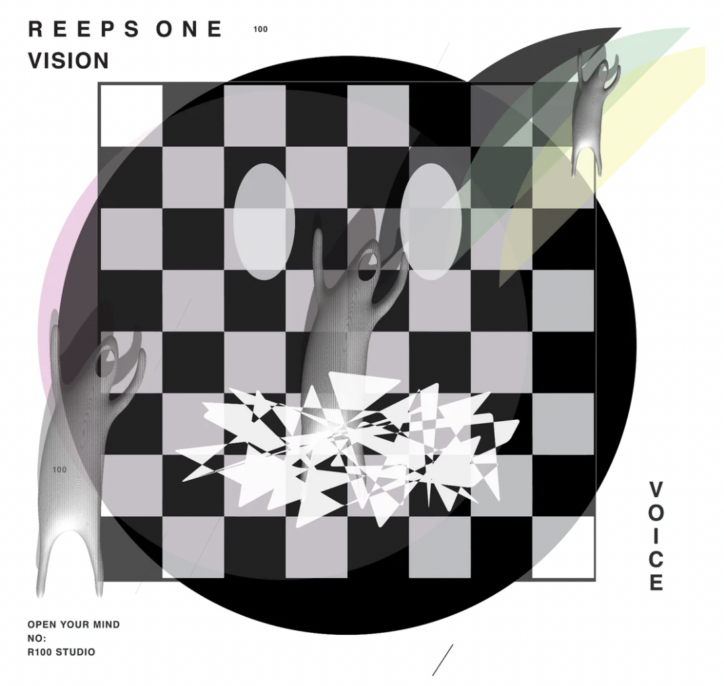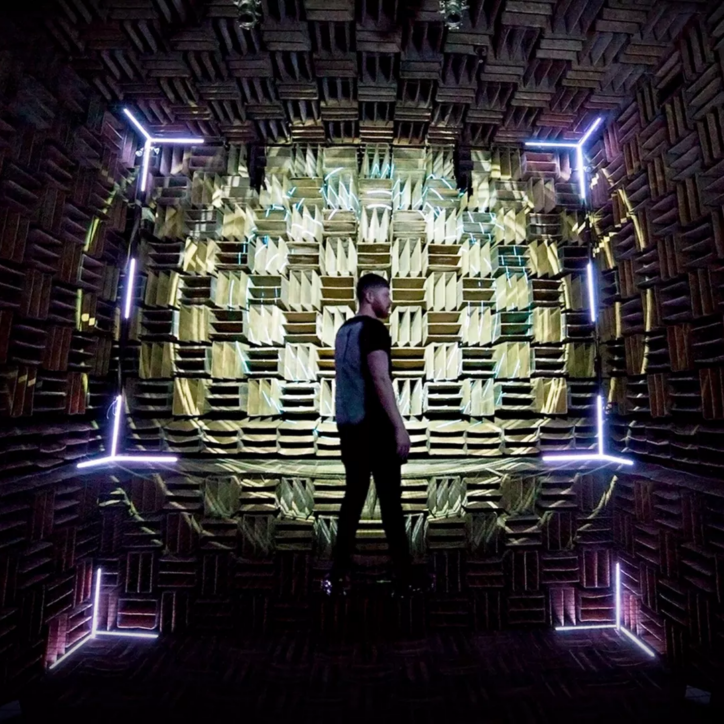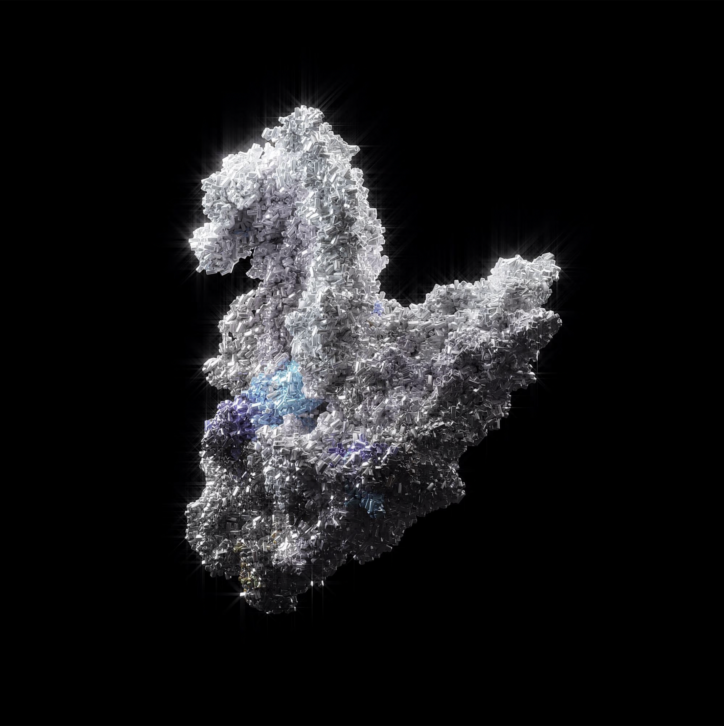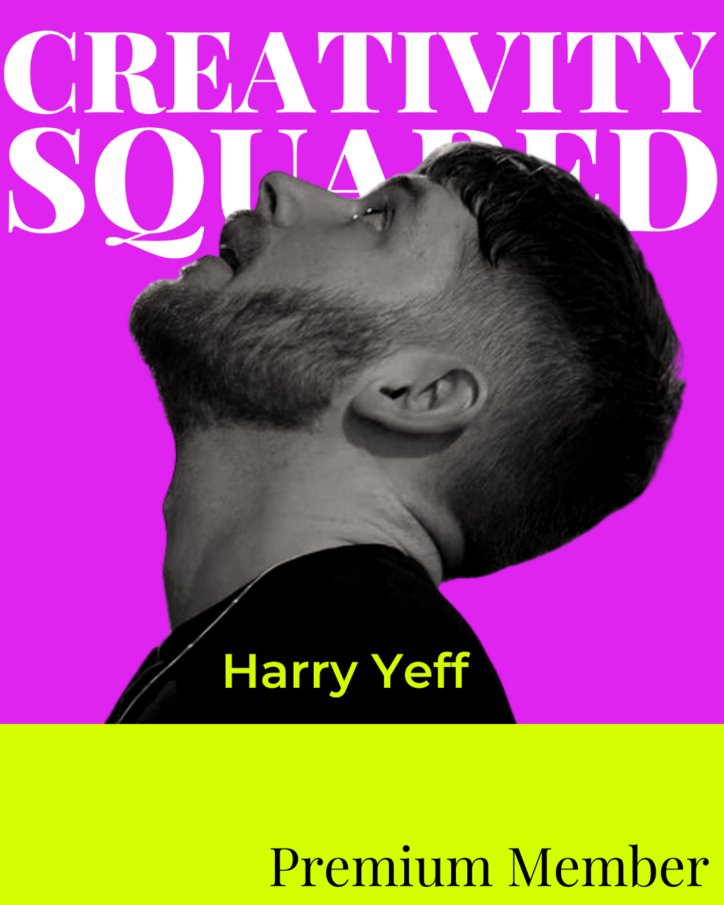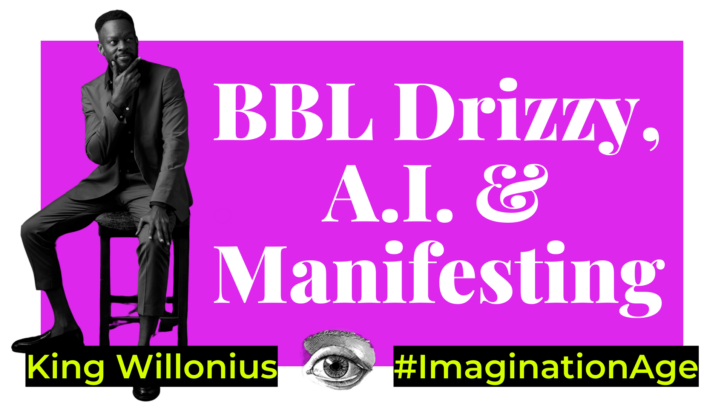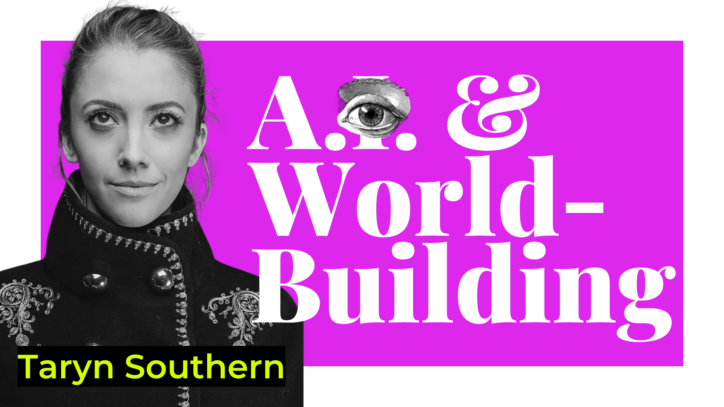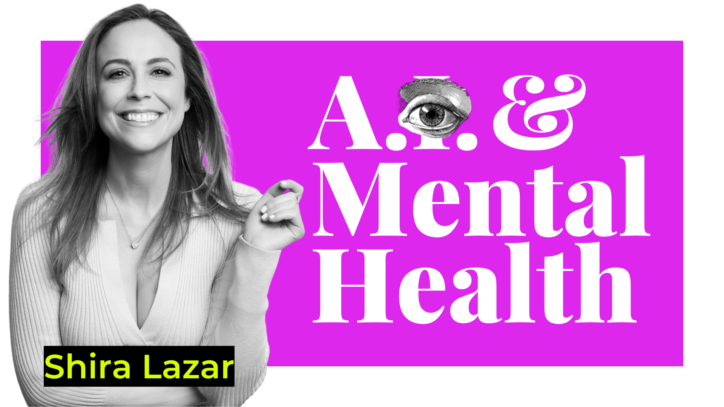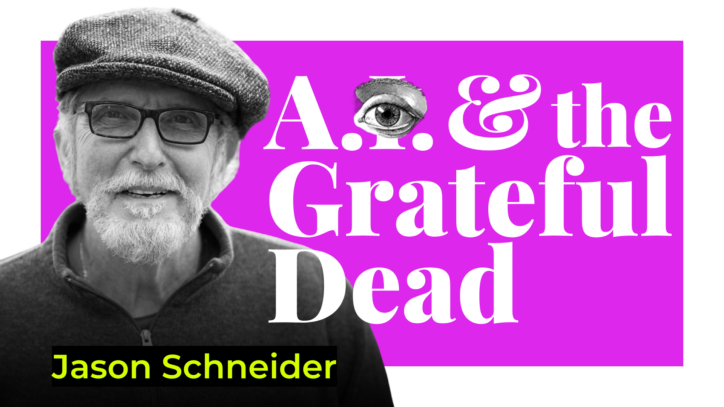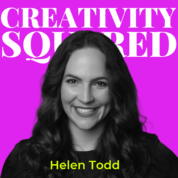
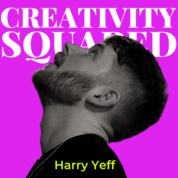
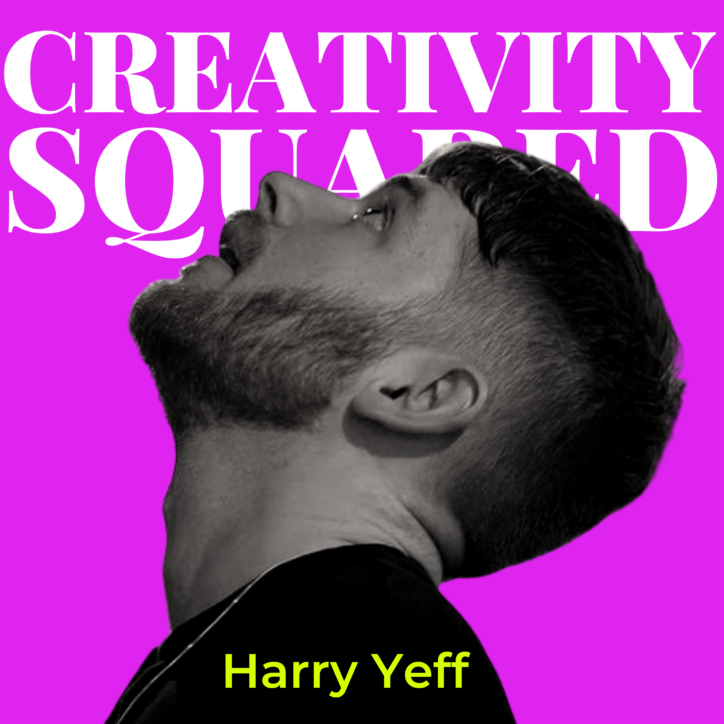
Ep1. My Second Self: Discover How World-Renowned Beatboxer & Voice Technologist Harry Yeff Collaborates with A.I.
Welcome to the first episode of Creativity Squared!
Meet Harry Yeff, a London-born neuro-divergent artist and technologist specializing in voice and the expression of voice across disciplines, contexts, technology, and media. While his research in human and A.I. collaboration started in 2016, Harry has a lifelong obsession with self-improvement and with the evolution of the human voice, and how far he can push his own.
With over 100M views on YouTube, his accolades are many and include being a world-renowned beatboxer and a guest lecturer at Harvard University. He’s been on stage at the World Economic Forum, TED, and Wired.
In the interview, Harry shares how he collaborates with companies like Bell Labs and trained their A.I. machines with his vocals to then beatbox with his “second self.” We also explore his digital VOICE GEMS project, how he sees art as ceremony for the human spirit, and so many more fascinating insights into his creative process with artificial intelligence.
Harry’s been visualizing voice for over 15 years and when it comes to pioneers in creativity and A.I., Harry is at the forefront of voice, conversation, and how this technology can help us become more human.
His perspectives, stories, and projects made him the perfect person to launch Creativity Squared!
The Power of A.I.
A.I. is power. Intelligence is power.
Harry believes that the biggest shortfall is when people completely dismiss an innovation as if it has nothing to do with their lives. A.I. and machine learning is already here. He points out that people need to update their perceptions of A.I. For instance, if he goes back to his hometown of East London, people still associate A.I. with science fiction. There needs to be a more profound conversation about how A.I. is present and will be present in people’s lives.
He thinks that artists, more than traditional tech experts, are responsible for ensuring that the right narratives permeate society so that people can learn and grow. This drives his own experimentation. How do we improve as human beings? What are ways of developing skills? Harry is a firm believer that A.I. will be a part of the question of how we can improve as human beings.
Creating a Second Self
Harry also talks about Second Self, an arts and science collaboration between himself, Dada Bots, and the E.A.T. program at Bell Labs. It was a duet of sorts and also an opposition between himself and A.I. He trained a machine to emulate his voice, creating a second self. The Deep Learning A.I. machine was able to replicate his composition and also predict what would follow. The collaboration raised awareness about machine learning beyond the academic, technological, and engineering demographics via the medium of film. Harry found the opposition and competition with his “second self” as really beautiful. A full mini-series was created around this project called We Speak Music that we can’t recommend enough!
Most people don’t realize how vast and how many innovations are still happening in vocal technique. With something so old and profound as the human voice, there are still new sounds and techniques being discovered. Harry pushes himself and believes that we should exercise the range of our voice like we exercise our bodies.
VOICE GEMS
The best art is made on the edge of fear.
Harry Yeff
In our interview with Harry, he described his project VOICE GEMS which is a generative system and voice archive designed by himself and Trung Bao. The system harnesses the fingerprint-like features found in the human voice to generate physical and digital one-of-a-kind gemstones. They’ve collected voices from engaged species, dying languages, and people like Dr. Jane Goodall and Herbert W. Franke to archive. The first VOICE GEM was created from the laughter between two partners and was used to replace a traditional engagement ring. Harry shares why the recent NFT drop of the Herbert W. Franke VOICE GEM is so meaningful.
Art as Ceremony
I’m so passionate that digital can be spiritual.
Harry Yeff
Harry believes the function of art is a ceremonial need to amplify the things that we love or hope for. His definition of spiritual is any artwork that you see or stand in front of that brings you back to something very fundamental.
Finding new ceremonial opportunities, like archiving voices, is important. We should be innovating ways to celebrate being alive.
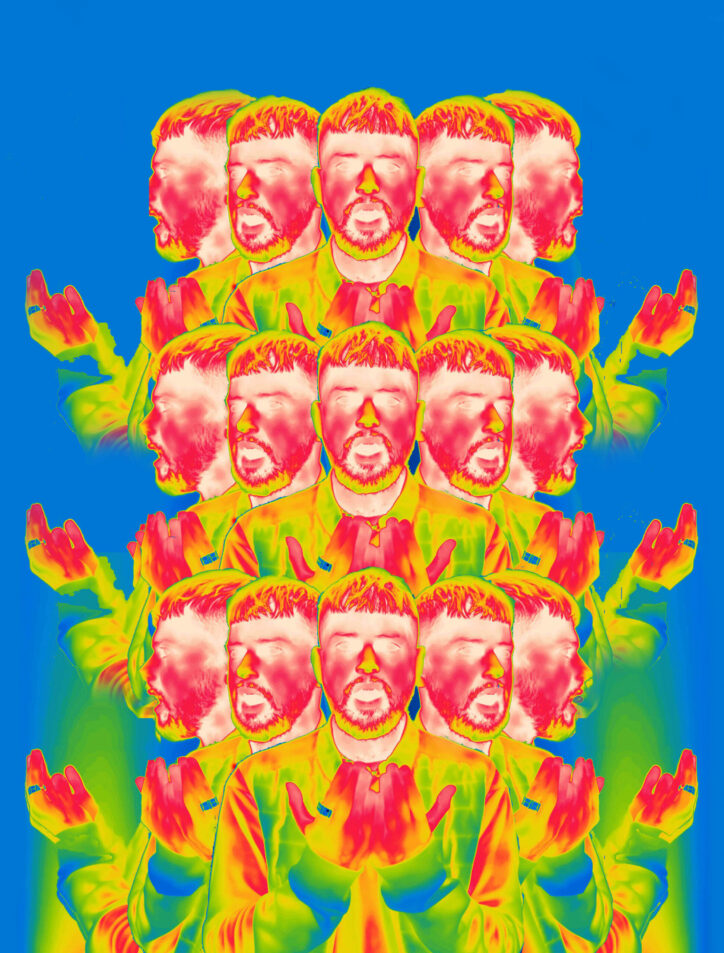
The Limits of Being Human
This new wave of A.I. is going to be like having running water in your home.
Harry Yeff
For Harry, being human is to be limited. He likens this new wave of A.I. to water on tap. Just as we have water coming out of the tap, A.I. provides intelligence on tap. However, that comes with a huge amount of power that requires literacy and understanding. We need to take responsibility rather than run away and try to understand A.I. as much as we can within our own lives.
He remains optimistic about the future of A.I, but we need to tread carefully. There are new mutations in art and intelligence that will emerge that people are not yet sensorially ready for. However, he is excited about the future and looks forward to seeing what will develop next.
Additional Links Mentioned in the Podcast
Connect with Harry
https://reeps100.com
https://instagram.com/reepsone
https://youtube.com/user/Reepsone
https://facebook.com/reepsone
https://twitter.com/Reeps1
Reeps100 Ghost Chess Board Print
The art piece in Helen’s podcast studio
this&that
this&that Conversation Lab
Continue the Conversation
A big thank you to Harry for joining us as Creativity Squared’s first guest!
Creativity Squared is brought to you by Sociality Squared, a social media agency who understands the magic of bringing people together around what they value and love: https://socialitysquared.com.
Because it’s important to support artists, 10% of all revenue Creativity Squared generates will go to ArtsWave, a nationally recognized non-profit that supports over 100 arts organizations.
This show is produced and made possible by the team at PLAY Audio Agency: https://playaudioagency.com.
Join Creativity Squared’s free weekly newsletter and become a premium supporter here.
TRANSCRIPT
Harry Yeff: Being human is being limited. What this new wave of AI is gonna be like having running water in your home, but instead of water coming out the tap, you have intelligence on tap.
Helen Todd: Harry Yeff is a London-based neurodivergent artist and technologist specializing in voice and the expression of voice across disciplines, contexts, technology, and media.
He has a lifelong obsession with self-improvement and with the evolution of human voice. And how far he can push his own. I met Harry at Bell Labs back in 2017 and from the outset have been incredibly impressed with him. He’s wildly talented and a deep thinker. He’s been researching human and AI collaboration since 2016, has over a hundred million views on YouTube, and is also a guest lecturer at Harvard University. His accolades are many, and also include being a world renowned beatboxer. He’s collaborated with companies like Bell Labs to train their AI machines and then beatbox with his second self. He’s been visualizing voice for over 15 years, and when it comes to pioneers in creativity and AI, Harry is at the forefront of voice, conversation, and how this technology can help us become more human.
I always enjoy my conversations with Harry, and I’m so excited to not only kick off Creativity Squared with our interview, but also for you to get to hear his amazing perspective, stories, and projects spanning from his current digital voice gems to seeing art as ceremony for the human spirit. So with that, let’s jump in.
Theme: But have you ever thought, what if this is all just a dream?
Helen Todd: Welcome to Creativity Squared. Discover how creatives are collaborating with artificial intelligence in your inbox, on YouTube, and on your preferred podcast platform. Hi, I’m Helen Todd, your host, and I’m so excited to have you join the weekly conversations I’m having with amazing pioneers in the space.
The intention of these conversations is to ignite our collective imagination at the intersection of AI and creativity, to envision a world where artists thrive.
I am so excited to have Harry Yeff here with us today. We go back to, I had to look it up this morning, like to 2017, where we met at Nokia Bell Labs for one of their luminary series with Stephen Fry. And it was so wonderful to get to meet you and follow you and become friends and discuss conversations ever since.
But for those who don’t know you, can you give a little bit of background of who you are, what you do, and what you’re passionate about?
Harry Yeff: Yeah, so I’m a founder in the voice and tech space, but I come from the arts. So I came out of music and performance, was a multinational beatbox champion, and my obsession with voice almost completely as a surprise to me, emerged into academic spaces with voice, new opportunities in technology with voice, and really to just be an astronaut of voice, to really think about what is the possible future of the human voice. And I don’t like labels. I feel like, with such a wide theme, it’s allowed me to explore and direct and create and build and, it’s definitely a day-to-day, not, not a boring thing.
But that weekend when we met, that was a very strange trip to New York, and it was a real highlight. Yeah, just watching Stephen Fry, being at Bell Labs and just us talking about the AI at the time.
Helen Todd: And that year, that was when you were one of their artists in residence, was that 2017 when you started working on the project.
So why, why don’t we, talk about that a little bit and for those who don’t know, maybe you could explain Nokia Bell Labs Artist Project and even their Antioch chamber, for those who don’t know about it too and why that was a such a special project.
Harry Yeff: I mean, yeah, so Bell Labs for those that don’t know, is a really old like tech institution.
And in the sixties in New York, there was a program called the Experiments in Art and Technology Program. So it actually started with figures like Rauschenberg and John Cage. And it was the first time that artists and engineers were really placed together. Even now it can be seen as experimental, so you can only imagine back then what society thought of it.
But they pioneered many different technologies and that program went all the way through till today. And I was one of the more recent additions to that lineage of artists experimenting with technology. So my key focus was what are opportunities to use machine learning and AI to learn about the human voice?
And is there a way that I can push myself as a practitioner of voice to learn and do things that I couldn’t have done without said technology? So it’s also important to note that Bell Labs have a really rich history in voice-specific research. Their foundations were in telecommunications, but they did the world’s first speech synthesis. And there’s some really interesting stories, influence like 2001 Space Odyssey and a lot of really foundational creative and tech-based ideas started there for the Western world. So to be a part of that was an honor. And I was flown out of London like 48 hours before to have dinner with Stephen Fry, with the team at Bell Labs, and it felt like a completely unplanned whirlwind.
So meeting you is at the very end of that like quite crazy experience.
Helen Todd: That’s amazing. Well, and I know one of the things that he said during his talk is that we need artists to help translate this technology. And you recently did a post on Instagram kind of saying a similar thing of like, that we need to be experimenting and understanding to really shape, you know, the conversations around AI specifically.
So when I tell people about this podcast, some people have like a visceral like reaction of “Oh, AI. It’s like the Terminator” and get really scared. And I think there are like genuine, you know, concerns and fears. But I definitely take the approach of embracing this technology and looking at it from an optimistic standpoint.
And I know you do too, so I’d love to hear kind of your thoughts on it as well.
Harry Yeff: Yeah, I mean like creative technologies specifically, and, and some artists, they’re almost like their enzymes of communication so they can find another way to really share these, I mean cuz this is the main thing. AI is power.
I think intelligence is power and that is a huge responsibility to consider. I think the biggest shortfalling is when people completely dismiss an innovation as if it’s nothing to do with their lives, and they, and also that they have a choice. So if you think about machine learning, it’s already affecting all of us.
We’re using our smart devices the way data is processed. A lot of stunning insights are being generated by these technologies as well that are influencing our lives. So, so it’s already very much here. So when the power is present, how can you win over millions and millions of people to have an open mind to see how this technology may benefit them, and also how the awareness of said technology can lead to better choice-making from a legislation level.
Because if you have a society of people covering their eyes and ears, it means that the innovators that are generating these technologies kind of keep all of the power. So it’s not just about being an accelerator of the technology. I’m much more an accelerator of the openness and the narrative, and so a lot of the pieces that I’ve made have reached demographics and individuals, and the kind of poetic ways of exploring these technologies means that you are just turning heads and raising awareness and creating a deeper connection because there is a spiritual quality to learning about yourself through the potential of these techs.
So I’m sure we’re gonna talk about this more, but there’s a big difference between using like general models, which are kind of products that are being given to you, trained on data sets that are about general people around general themes, and you actually using these tools to learn about yourself for you. So I think artists more than the kind of traditional tech space, are really responsible for making sure the right narratives permeate society so that they’re open and so that they learn.
And that’s really what drives a lot of my own experimentation, and I’m completely obsessed with like “how do we improve as human beings? Like what are ways of, of developing skills?” I think it’s such a powerful, powerful subject and AI is definitely gonna be a part of that question for a very long time.
Helen Todd: I love it. And I have so many questions just based on what you said. Before I go back to some of the pre-written ones, you mentioned regulation and I’m so glad that you did. And I, cuz I’m very pro-regulation and I don’t think there’s good regulation for our current technology and it’s only gonna get crazier and wilder.
So I’m curious if you have any thoughts on what would be good regulation before I feel like it’s moving at breakneck speed already. But like, have you thought about that? Like what would that look like?
Harry Yeff: I mean, I think that’s the question of the hour. I think that the main thing is the, I’ve already mentioned the awareness, but I think, I think there’s definitely a really obvious answer, which is on top of awareness, it’s just education. I don’t think there’s been a call and a lot of thinking about a total pause on these things. And as sad as it is, I don’t think I’ve ever seen human beings be able to kind of not move towards the lamp of, of power. I think if we are to kind put this in a dark cave and lock, lock the key. There will be someone somewhere that is continuing forward at full throttle when it comes to really kind of leveraging the power of this. So it’s not my place to say what is good regulation? I like to think of like, well, what’s in the kind of the hundred thousand people that are around me and engage with x, y project or idea? I think it’s, it’s that awareness and that education is the most kind of high level personal first step. Because if I go back to where I grew up, in East London and I talk about artificial intelligence, it’s all science fiction narratives and that is something that needs to be updated.
I think there has to be a kind of a much more profound conversation about how this is present and will be present in people’s lives.
Helen Todd: Yeah, that’s fair. Okay. I had to ask though. I couldn’t help myself. So let’s go back to the early days. What was your first experience with AI?
Harry Yeff: So, I have a, I’ve always had a warm approach to the concept of AI because, well, so as a teenager, my first real passion was chess.
So chess was, Help me realize that I can think for myself and I can have my own ideas. I am neuro divergent. I grew up in a neuro divergent home like both my parents, and there was some, some huge challenges to that. And I think everything in my surroundings suggested that I would never have more than what was kind of directly in front of me and for many of my friends, growing up, that was definitely the narrative that was pushed on you.
But when I found chess, it gave me something that I could use my intuition and any potential ability to think through things on my own terms, and I really took to it. I became county champion and then played in a slew of tournaments. But the reason that I improved was because my father bought me for Christmas, was a simple AI chessboard.
So from the age of seven up until 14, this concept of like self-development and improving, it never got tired. It never got bored. Like it would always want to – “it” as a personification – but the system would allow me to learn. And it was actually that narrative that stayed with me all the way through till my time at Harvard University, where I realized I actually had access to new innovations with AI that I could then apply to my practice at that time, which was voice.
So it all started with chess at a very young age with a simple AI chessboard.
Helen Todd: I love that – the way that you talk about competition as like one of your best collaborators kind of helped inform your Second Self piece at Nokia Bell Labs, correct?
Harry Yeff: Yeah. So, jumping ahead. So I did a series of guest lectures and residencies at Harvard University.
And it was there that I met CJ Carr from Data Bots, who’s an incredible generative like music and AI polymath, and a good friend. And when I realized that, okay, so I can now create my own data sets and, and start training, it reminded me of a lot of the narratives regarding chess and Go, which is very established that within game theory, some of the most powerful examples of human computing were actually leading to innovations from the partnership with machines.
So kind of a centaur-like connection. And it was very established that machine play was much stronger than Magnus Carlson, who’s the kind of potentially the greatest chess player who’s ever lived. So within this work that you mentioned, Second Self was a duet of sorts, but it was also an opposition.
So in chess, my greatest innovations came from my opponents. Like I saw them as collaborators, the way that they would challenge me and they would push me out of my comfort zone and out of my habits into truly new ground. And I think that’s where that kind of mutational learning and ideation occurs when you’re actually outside of your comfort and outside your realm of thinking.
So I think for any discipline in the world, working with AI to generate insight and obviously there’s, there’s varying degrees of the intelligence of those insights, but that as a dynamic, I think is something you will see more and more.
So, Second Self was based in the anechoic chamber at Bell Labs, and we had a physical and visual embodiment of this second voice sounding like me, performed like me, and this interaction was effectively a metaphor for the meeting, the learning, the mentorship, and then the opposition of an AI. And I think that’s where I differ to a lot of different people. I think the opposition and the competition is actually really beautiful, and I think there’s so much growth and potential that happens in that uncomfortable space.
And we can discuss the power and the regulation, which is so, so important. But just conceptually, just spending a moment with thinking about all the times that you’ve been challenged or you’ve had to face yourself in a way that is, can be profound. And I think that’s again, where, where the growth happened.
So Second Self was a representation of that. And then we ended up touring that around a series of film festivals. We showcased it at United Nations Google Exec, and it was seen as and still is, it’s aged very well. Cuz that was recorded in, I think, yeah, 2018. So we’re very proud of that piece.
Helen Todd: Yeah, and I’ll, I’ll be sure to link, link it to the show notes because I’ve definitely watched it many times and recommend it often. So when, when you heard your, like second self voice from the machine for the first time, like what was your initial reaction and what were, what were you feeling at that moment?
Harry Yeff: So my reaction was the complete opposite of every single other of my peers that I played it to for the first time. So I was excited, challenged, because every single human voice on earth is unique and something that people don’t appreciate is it’s an absolute just master example of like, engineering.
Like the conversation we’re having now is one of the most complex acts in all of nature. So normally there’s only one of your voice, so to have spent 30,000 hours like training and practicing and designing sounds and learning to then hear ideas generated that I have not done was a really challenging thought.
But for me, that led to being super excited. Everybody else found it borderline disturbing, especially my speaking voice, like hearing phrases. And this was kind of way before, a sort of text-to-voice synthesis was more common. People are like, “so, so what is this? And like, why are you saying these things?”
And some of it was gibberish and phrases that I’ve never said. So I found that so interesting that my disposition and maybe the way that the experiences I had, the narratives I had in my mind led to such a visceral difference in reaction between me and my peers and especially my friends and my relationships.
So that was a challenge at the very beginning that I had to kind of think about and really consider if I wanted to go deeper into that hole.
Helen Todd: So, so what made you want to go deeper then?
Harry Yeff: Yes, absolutely. Like I, I think the best art is made on the edge of fear. I think a lot of the best human experiences when it comes to just how we challenge ourselves, there’s a, there’s a, again, you have to be very careful, but the, especially as an artist, I think that there’s making beautiful things and there’s making things that makes, kind of brings entertainment to someone. But to really serve somebody, to like bring an idea that might influence how they think or affect the zeitgeist in some way, I think you have to move into spaces where maybe everyone else around you is kind of going, “hold on, no, don’t. That’s not useful. That’s not important.” But there was something in me that wanted me to drive forward because my main value is about self-development and learning, and it started with my own voice. So now it’s, now it’s the world’s voices. So the focus yeah, the focus to go further and deeper just came really naturally.
Helen Todd: I love that. And I love how you just wanna push yourself with your own voice and then also push just the broader zeitgeist and conversation as well. And I’m hopping around just a little bit, but for those who don’t know, like how profound your voice is, why don’t we take a little detour on that cuz you have, Sophie Scott in the UK who’s an academic studying your voice.
I know you have a couple out like world records with your voice. So can you give us some context to, so people who don’t know you, like, so we understand who we’re, who we’re listening to and, and the voice that we’re, we’re hearing right now?
Harry Yeff: Yeah. So it’s not a normal journey at all. So you would never associate beat boxing with fine art or technology.
But at the very heart of that culture, especially like the more modern examples of it, you see this kind of obsessive exploration of what is the potential of a voice. So growing up in London, I was surrounded by very intense electronic music, and that’s what I channeled into my style. So I became like double national champion.
I went on to judge the world championships. I ended up judging every single major competition on the planet. And my vocal range and finding sounds and innovating that was my temple for a very long time. And people don’t realize just how vast and how many innovations are still happening in vocal technique.
It’s almost like you imagine finding a new way to move. And I think it’s so strange that something as old and profound as a human voice, there are still new sounds and techniques being discovered. So I was a big part of pushing forward the kind of modern culture when it comes to new techniques. I also have one of the largest vocal ranges on the planet, not just in singing voice, but hundreds and hundreds of sounds.
And it was in after touring a lot, I ended up being approached by Sophie Scott, who is now the director of the neurology department at UCL. But I did a series of voice-based studies because I had this hyper control, I could control my voice in a way that most of the world couldn’t. And that was the beginning of like my kind of academic collaborations and meeting a lot of the global academic community around voice. But part of a, a music doc, a documentary we’re making about voice, music, and culture and AI in 2019, I went in for an experiment with Sophie Scott where she used a breath belt. So it recorded the kind of movement of my diaphragm,.
It was there that I recorded the fastest ever use of the human diaphragm which isn’t something that is, I say musically applicable, but it just shows the level of control that can be unlocked with a different approach. And something, this is a bit of a tangent, but I just wanna say that we’re, it’s so established that we stretch our bodies, right?
And it’s so important that we explore our range. But the voice is both the body and the mind, like the way that you think and your character and your identity is hugely affected by how you talk. And it’s not that you have to go completely crazy like me in terms of technique, but just what is your range and do you stretch your voice?
And there’s a lot of really interesting evidence to back that if you are stretching the voice, you are also stretching the mind. And one other example is, if I was to always speak like this, how would it affect my relationships? Like the people around me, my quality of life. So outside of the things that you say in the language, you also, massively impact your sense of self and, and the connections around you.
So there’s this kind of sometimes invisible set of ideas that I find really crazy that aren’t discussed more, but that’s a kind of arc from kind of super technical, machine-like beatbox into kind of more the concept and the holistic thoughts around voice. And, and this is really a product of having a huge privilege that my work has allowed me to meet these people and explore and collect more ideas and drive that into my art.
Helen Todd: Yeah, and I know you’ve said before, like, as our voice grows, we grow. And I feel like that kind of encapsulates that really beautifully too.
Harry Yeff: Yeah. I mean, absolutely. Yeah. There’s, there’s a, there’s a direct correlation there between I think how we strengthen our voice, overcome like trauma and frustration. Like if you can’t, if you can’t open up your voice, where does that come from?
Like I, I did a talk with Google and at the end I had the entire room scream. And as obvious as that sounds like, it’s interesting that someone came up to me afterwards, she’s like, I struggle to do that just to, just to open up, and I think it’s interesting to, just to think about that for a moment.
If you have limitations in your voice, where does that come from? Using it as a window into the self.
Helen Todd: Yeah, I know I was told when I was young that I couldn’t sing, so I’ve always had a limiting belief around the use of my voice in that way, which I still haven’t fully like, unpacked and explored. But I know yeah, voice is tied so much to identity.
And, Sophie Scott, I think, in ‘We Speak Music’ also kind of shared like it conveys so much because it’s almost like the sounds are pre-language and that we don’t even fully understand what’s conveyed in all the elements of voice. So I don’t know if you wanna speak to that of just like yeah, what is conveyed?
Harry Yeff: Yeah. Well, I think to like, sometimes a really good way to frame things is to kind of not think about human beings. If you look in the natural world, like vocal displays, whether high or low can mean very different things. Whether it’s courting whether it’s to show dominance or to assert, like a lot of animals will lower their voices and make themselves bigger to, to send a message effectively.
So this isn’t just a human thing, but this is more anecdotal, but it’s just a fascinating thought for everybody. But next time you’re with a group of people, someone yawns and then you yawn, or they laugh and then you laugh. Think about where that might be coming from because it’s interesting to think about a lot of pre-language, sort of societal shared kind of ceremony.
So crying, yawning, laughter, which are three old language, profound aspects of being a human being. But these, there are things that can [unintelligible] that in the natural world. So I think there is, there’s a lot of information. And there’s a lot of storytelling and there’s a lot of like creation of your identity and projection of your identity that is in your voice without language.
Like, just the tone and the placement and how you support your voice are other forms of communication. So this was one of the main terms that came up in my work is paralanguage, so it’s all of the meta information that’s stored within the voice that is non-linguistic. And I think that’s a really fascinating space.
All of the music that’s in your voice that is channeled through the vehicle of speech. And we sometimes go our whole lives without giving that second thought. And how strange is that?
Helen Todd: And when you say the para, what? What did you say? The paralanguage.
Harry Yeff: Para language.
Helen Todd: Paralanguage. Is that cuz I, I have seen, I don’t know, maybe on your Instagram, is that where you’ve tried or where you’ve like actually marked up and created like the written version of that? Is that what you’re talking about?
Harry Yeff: So, so, so, well no, so that would be like to, to visually score or represent choices in voice. That would be like obviously a I’ve done quite a lot of work in visualizing voice. I’ve been visualizing the human voice for about 10 years, and that’s obviously like an interpretation of, but, but paralanguage is objective.
It’s not one expression, it’s the fact. So as I’m speaking now. There’s, there’s the words that I’m saying, but the, the tone of my voice, the actual music of my voice can change. So I can say the same thing 10 different ways. So what’s changing is not the language, it’s the paralanguage. And that’s, again, not something that people think about a lot is your, is your.
Yeah, your, your paravocal identity outside of language. and it, it makes such a huge difference. And there’s also a lot of for specific industries, how certain accents or tonalities are suited to the kind of things that you’re trying to achieve, which is really interesting. In the UK, people from the north are, are heavily employed for working on phones because it creates a kind of warmer, more sort of comforting energy.
So there is more going on than people necessarily think about and being aware of that can help you send additional messages if you wanna be more heard, if you wanna have a more sort of space and room. Or if you wanna be delicate and and vulnerable with someone, like it’s the paralanguage that can really help influence that necessarily what you say.
Helen Todd: Okay. That makes sense. And since you mentioned visualizing the voice, I feel like this is a good segue to talk about some of your other projects. I know, we can go into whichever one you’d like to take out of your portfolio, but I know a recent one is your voice gems. So if you wanna go there, and share it with everyone, kind of the inception of voice gems and, and your very recent NFT drop.
I’d love to kind of explore this some.
Harry Yeff: Yeah. So as I mentioned, I’ve spent a lot of time thinking about my own voice, but I think more recently, over the last few years, I’m much more interested in the world of voices that are out there. And voice gems is the seventh generative system that I’ve designed.
So a generative system is really a sequence of rules that lead to an outcome. And in this case, by taking any voice in the world, so anyone that is listening now, like your voice, Helen, if we place your voice as data through the system, it will produce a one of one unique digital gemstone. So the colors and the shape are like a fingerprint representation, like of your, of your voice.
And the very first voice gem actually happened because I was giving a performance with Wired and generating these voice-based sculptures, and someone came up to me and they said, “I want to propose to my partner. I wanna do it in a brand new way. I would love to send you a recording of her laughter, so us laughing together and can you produce this into a piece?”
So we produced a digital gemstone and then that was actually used as a replacement for a physical diamond and that was the beginning of voice gems in a public sense, something that we’ve been working on for some time before. And now it’s grown. Myself and my partner on the project, Trung Bao, we effectively collect voices from all over the world and generate pieces, and then we preserve them in what we call the thousand year voice gem archive.
So it’s a sprawling project. We collect voices for lots of different reasons, but we’ve done from critically endangered species dying languages, like messages from individuals like Ai Weiwei and Jane Goodall and Reggie Watts, and artists like Felipe Pantone. But it’s, it’s become something that is very organically growing into this stunning archive of not just artworks, but stories and every single set is distributed in different ways.
Some are kept locked away and never shown to the world and kept private. Other ones are showcased, like we did the largest digital exhibition at the World Economic Forum, of a digital like pieces where there were 17 messages of hope. But then voice gems is, I do not call it an NFT project, but when we partner with a voice and it makes sense for that as a distribution method for, for that decision, then we also like sell works in, in this sense as well. So lots [00:32:00] of different elements, but I am in love with that project and the, the stories that it can tell.
Helen Todd: I had no idea that that was the inception was someone’s laughter for a proposal. I had chills when you were sharing that part of the story. So that’s such a beautiful beginning for this project.
So, let’s talk about your recent NFT project with Herbert W Franke. What a cool opportunity that he reached out to you. So can you, for people who don’t know who he is, can you kind of share who he is and why this was like so special that he got involved in the Voice Gems project?
Harry Yeff: Yeah. I mean, so for people that don’t know, yeah. Herbert is a pioneer in digital art. He’s one of the founders of Ars Electronica. He was making computational art in the sixties and was just a juggernaut of experimentation, like the way that he played and defined and, and repurposed a lot of technologies and is just such a stunning lineage of work.
And he was 95 at the time, but we were actually part of an exhibition in Linz at a museum called Proof of Art. It was the world’s first museum exhibition for effectively important NFT works and also potentially future important digital works. So he visited that exhibition with his wife. He was also showcasing and he saw the three pieces that we had, and he decided to get in touch.
And this was in 2021. And we spoke a bit about just different themes and about how the system was designed and what it is. And effectively we started to work on a series of his poems cuz he’s a very established science fiction writer in Germany. And the astropoetic on poems are almost expressions and sharings of what it’s like to be a human being, but also existence as a whole.
So we released three of those pieces. They were collected, but it’s a lineage of actually 16 poems. So sadly last year, he passed away and very few projects have his blessing to continue. So we, with his wife and with his, yeah, with his insight and respect for the project, we collaborated with Expanded.art and Elementum, which are two like yeah, incredible galleries, in the digital space.
And we released one piece as an open edition. So that’s one of the, the 16 total. And yeah, the works were collected. You collected, which I’m super grateful for. But it’s a super special project because of, it’s part of his legacy and like that’s what’s quite powerful about housing a voice inside of an object.
Like normally a voice is something that is like smoke, where this allows you to place like media or any kind of sharing in something that can be kept, and we were just, myself and Trung were blown away by his support and wanting to be a part of the project. and I highly recommend checking out his work.
He’s, he’s a true pioneer.
Helen Todd: That’s amazing. And I’ll definitely include everything in the show notes as well, for anyone who wants to learn more. Cuz I think on his Twitter account, it has all the lyrics or the, the lines and the poem too if you don’t speak German.
So I, I think actually this brings up an interesting point on art and the human spirit and like how these new technologies can capture it and how powerful the voice captures the human spirit.
When I was listening to, to him speak of wth the voice gem it, it meant so much just knowing that he’s passed and then this is part of his [00:36:00] legacy and I felt like kind of his spirit was preserved. but I’ve never actually talked to you about kind of more the, the spiritual aspect of art. So I’d love to kind of hear your thoughts on how you think about it, whether it’s with him or your own work.
Harry Yeff: There are certain themes in life that I think most human beings agree that are, are important and like legacy is one, love is another and hope, hope is one more, right? And I think so much is quick and cold in the world, like think there’s so much efficiency and like pushing forward. But with all of the kind of change, I’m really fascinated by what is like if you take a step away from art, like what is ceremony?
And I think we, we can forget that a lot of traditional ceremony was there to help us collectively be reminded of themes that are really important. And if we are grieving someone, what do we do to really honor that? Something that allows us to heal and like move forward. So obviously there’s the art market here and there’s the selling of artworks, and then there’s the kind of, the hype train of social media and engagement and the attention economy.
But if you kind of, if you dig underneath all of that, I think you eventually get to the, the function of art as a ceremonial need to amplify the things that we, that we love or have hoped for. And I think that’s something that we’re at risk of losing sometimes. So my definition of spiritual is any artwork or when you’re stood in front of something and it, and it brings you back to something very fundamental.
And not all art does that, and no artists can sort of themselves claim that their art does that. But I think that that is such a, such a goal and I don’t think such a thing discriminates based on the medium, whether you’re using artificial intelligence or you’re in the deepest part of traditional kind of ceremony and song.
I think it’s about that sentiment of, of what do we really value? So I’m so passionate that digital can be spiritual. And what happened with voice gems is when we get started getting our first bits of global press, we were really taken back because we received hundreds of messages from people that, that were telling us, like “I have, I have this voice note of my grandmother. I have this small recording of my brother. I dunno where to put it. It lives on a laptop or a hard drive. It’s like, I wanna, I wanna put it somewhere beautiful. I wanna put it somewhere ceremonial that I can, that I can hold onto it.” And that’s something that we’re still working out is the responsibility of that.
But as we create more and more media that will live longer than us, I think finding new ceremonial opportunities to house these ideas is such a important innovation. If we’re gonna innovate everywhere else, why aren’t the ways in which we celebrate being alive innovating as well? So, that’s something that I think is so, so important and people forget that that is the function of art in a lot of ways.
And, it’s terrifying when it’s seen as something that is absolutely not a priority of any kind. It drives me a bit crazy, to be honest.
Helen Todd: Yeah, that’s beautiful. I got chills again hearing you talk about it: art as ceremony. That, that’s really beautiful.
I wanna be conscientious of the time, but there’s so much that we still can talk about. I wanna make sure that we cover everything. I actually can’t listen to my dad’s voice without breaking down and crying.
Harry Yeff: Yeah, I’m sorry. Hmm.
Helen Todd:: Yeah, and it’s been a couple years, but it’s just so powerful how those are. So I think it’s so beautiful that you are, you know, kind of finding a home and being really thoughtful about, you know, how to capture the voice.
And, you know, in light of voice cloning and deep fakes and all of these things that, you know, is very sci-fi and coming into mainstream, you mentioned earlier in the conversation, using your own data and your own voice to improve yourself. So I wanted to kind of, you know, dovetail back into that part of the conversation of why it’s important. Or how you think about like your own voice and first party data in relation to your craft as well.
Harry Yeff: So when we look at tools like ChatGPT as powerful as they are, they’re trained on zeitgeist levels of information that are global. It’s completely holistic and, and huge and like sprawling. So just to paint a picture, you are a writer. You have a hundred articles that you’ve written, and you are interested in ways in which you can develop insight.
And if you don’t think about the prejudices that can be around a technology, if you’re gonna go to a course or if you’re gonna have a phone call with a friend, why not use every single possibility that’s available to you to kind of learn and, and develop insights? So if you were to then take those hundred articles and use that as a data set to then generate new works which you then took inspiration from what, what’s going on there?
So it definitely still makes people feel uncomfortable, but I see that process as a very, very powerful process in terms of, it’s like a flashlight that points inwards. It allows you to see things and illuminate things about yourself that maybe you can in any other way.
So an example for me, is I did a collaboration with the Mill in New York and they created a listening model. So I would do a three minute performance at 200 BPM. So really, really complex percussion [00:42:00] and that listening model could identify how many variations of kick drum, how many variations of high-hat have I performed in that piece?
And that sounds very cold and very like technical. But for someone that’s spent as long as I have, thinking about my own voice and obsessing and trying to find ways to grow and learn to, to, to learn something new and to actually start to then categorize them and to make even more detailed like separation, you can find a fractillion level of new opportunities to understand yourself.
And that is no joke. Like that’s a really powerful, serious process. And I think this is a really, really important thing, is you’ll have more and more opportunities to just take individualistic private, not shared opportunities to learn. And there will be many of these like general model tools that are pitched and they’re subscriptions, and you’ll see advances in personal assistants where you’re simply voice commanding and talking to these models.
But what will you create for yourself as an individual? What kind of flashlight will you use and where will you point it? And I think that is something that is very, very powerful and people should be more open to, because I think it, there is a, there, there is something very, almost spiritual in the types of insights that you can learn about yourselves.
And I think that’s something that I’m really, really interested in.
Helen Todd: That’s so beautifully said about the flashlight looking inwards. Is there like an a-ha or insight that you’ve learned about yourself that you’re willing to share or can share with us?
Harry Yeff: I think the most important thing was with any expertise you have these kind of habits of behaviors. So especially with, with my music, there’s these very meticulous choice for the way certain sounds move into each other. So it’s like a chain. So you have a chain with like thousands of different combinations that you kind of learn and you think, okay, this is the only way to do that.
But then when I started to hear whole new phrases that were generated with my voice, because it’s, it’s neither something totally alien, but also not you, you have these kind of progressive elements. So hearing phrases with sounds that I’ve done for like nearly 20 years ideated upon and then yeah, developing new ones – that was something that was really interesting for me.
And also just hearing technical prowess using my voice that I could use as a, as a reference, I think is such an interest, like seeing a ghost three years in front of you that you can chase. It’s allowed me to, I can do things now and the sort of speed and control that I have.
And also just the way I think about music, like hearing ideas that I never would’ve thought of has given such life and enrichment to creativity. If I forget about anyone else, I’ve just found it so fascinating. So even though that’s not a specific, like sound or something to, yeah, something to show, it’s those kinds of insights that just give me so much inspiration, and I think when it comes to creativity that’s so important. We can become so bored of the things that we’re very good at, and that’s the biggest killer I think.
Helen Todd: Well, and I’m so curious because you are such at a high level when it comes to your voice and your craft, especially with beatboxing, and that you said at the very beginning, you know, with competition, that those are your best collaborators, do you find that your most challenging collaborator to date is your own voice in the, in the Second Self version?
Harry Yeff: Not just me, Helen, like every single person on earth, their greatest opponent is themselves. It’s like people struggle to look in the mirror. Like looking at yourself in the mirror, dead in, in the eyes for 30 seconds can be very hard.
And so the equivalent of that for your creative process plus plus is of course, like a really challenging idea. I mean, so something that you don’t know, is I’ve actually been writing Creative Direction and composing for an international ballet in Leipzig. So I’ve been working on a piece with them.
So 25 international dancers. But the piece is called Fusion and it’s all about human machine collaboration. And when I first started sharing some of my process with the very traditional, conservative, incredible like teams there, it definitely raised some eyebrows. It was very, very challenging for people.
So that, I totally empathize with the fact that it can be disruptive, but jumping into that wave on your terms for yourself, not buying products that are necessarily sort of mass distributed. It’s just something that maybe people should think about because that’s a huge, it’s a different genre of process to a lot of these kind of tools that are, that are out there currently.
Helen Todd: Yeah. So deep, so deep, Harry. Are there any commercial tools that you know of where people can play in the same way that you’ve got to play? Or are those not, you know, to market yet?
Harry Yeff: There’s more and more specifically with voice coming. There are ways of generating like elements of voice and it’s also very simple, like AI music tools with like Google Magenta and things like that.
But currently, I, I wouldn’t say it’s as accessible, but I say, give it a year and people will be able to generate their own works, but also it’s collaborative. And a lot of the ways that I’ve always worked is collaborative. Think of local universities, like even just reaching out to specific like startups and tech institutions, you’d be so surprised how they can actually be really open and sometimes desperate for creativity.
So definitely, I’d say look out for I think what will be released, but also just take the initiative and be collaborative.
Helen Todd: I love that. Well, and one thing that we have to make sure to talk about, speaking of collaboration and the power of conversation is your project This and That, which is really kind of a laboratory that studies and celebrates, conversation.
So I’d love to kind of hear more about that, kind of the, the first inception of it and where it’s at and what your goals are for it.
Harry Yeff: Yeah, so voice gems, as I mentioned, was about this kind of almost explosively artistic expression of voice. This and That is all about helping people understand their voices on a much more like direct, like conversational level.
So, me and my co-founder Rafe Offer, we just had our seed round actually to basically fund the next two years of trying to help the world speak and listen. And we’re particularly interested on, on one-on-one communication. So how do you sit down and just speak to someone and how often do you do that?
Because one of our concerns and something we saw, we had thousands of conversations with people. We had lots of different collaborations with not knowing what will be human and what will be machine very soon, and especially for younger generations, the digital presence is so strong, we just see sitting down, having an in-person face-to-face conversation as a potential antidote to keep a certain type of, of skill and, and quality of connection.
But we don’t really keep track of how often we have those really high quality discussions. And we’re really interested in how people prepare to talk to each other. So kind of how we’re doing this conversation now, what did we do to be, to be ready? Like are we being honest? Are we putting on a character?
And we’re also very interested in obviously analysis. There are many conversations where voices of minorities and also female voices are not listened to, especially, interesting insights. If a woman speaks first in a group conversation, that influence influences the balance.
I’m not mansplaining here, I’m just sharing and the, the idea. Yeah. So, the idea is, What are imbalances in conversation? What are ways to help people think about and develop insights for conversation, but specifically for younger people having one-to-ones, and that, for me, that’s still voice. So if you look back at everything that we’ve discussed, it’s all about how can I slash we think about, making the world consider their voice and in helping people feel heard?
And that’s, that’s my lifelong mission. And my co-founder, Rafe Offer, he founded Sofar Sound. So he built a global community around music and hearing music in a very different way. So, we’ve been talking and speaking to people like yourself and building a community of people that are interested in that kind of mission.
And it’s even though it has connotations of smart technology and AI, the, it’s all human facing and it’s trying to again, bring it back to the individual and help people feel empowered and, and feel heard.
Helen Todd: Yeah, I know I’ve been privileged enough to be part of the community, and I think it was during the pandemic where you really started hosting a lot of chats of bringing interesting people together to ask really interesting questions around conversation and what that means.
So I think that’s something that, you know, everyone listening or watching can can marinate on of what does conversation mean in light of 2023 when screens and distractions and noise interrupt us all the time.
Harry Yeff: I think it’s a complex, it’s a very complex, but very important thing to keep track of if we think of how we sleep and how we exercise. Like what is our diet of conversation?
But it’s we are really excited about where that can go, and it’s a huge, huge challenge. But complex problems bring really interesting people in, into the circle. So we’ll see where that goes. But all of this and sharing it, it’s not a traditional journey.
It’s not, it’s not something that you would expect. But as innovation, I think kicks in in new ways. There’s more and more reason to have more flashlights on these problems and there’s more confusion. So trying to make sense of the chaos, I think is, is aim. I’ve just chosen the human voice to, to do that.
Helen Todd: Yeah. I love it. And it’s such like an embodied element of being human in the midst of all this tech as well.
Well, since we’re kind of getting to the end, and I, I feel like chaos is a great note to segue into predictions of what you think or maybe what you hope for the future since it’s moving so fast of maybe the possibilities of what we can do with with this tech.
Harry Yeff: I think being human is being limited. And I think people forget that. I think this kind of abundance of everything is very dangerous for, for a lot of reasons. But when we see new power and new ways to kind of have intelligence, like in some ways I think what this new wave of AI is gonna be like having running water in your home.
But instead of water coming out the tap, you have intelligence on tap. That’s that huge amount of power requires a certain level of literacy and understanding. So taking the responsibility to not run away, but just try to understand as much as you can, will really help you guide how it interrupts your life or works with you in your life.
So I think just one prediction is, we will see more and more second selves, we will see experts who are very good at something with different ways of, of re-meeting their skills and disrupting themselves or learning.
So the thing that I always say is that these systems are mentors, collaborators, and opponents. So whether you’re an artist, a musician, a writer, whether you are a lawyer, when you are planning, you’ll be standing on the shoulders of these systems. The question is, are you just letting these systems be unchecked data-driven expressions, that might sound good? Or are you creating yourself ways of, of working with these models and using your own data to, to drive them?
There will be a time where I think people will start asking, is this human-made? Like, is this advertisement human-generated or does it involve AI process? So, I remain optimistic. I think we must tread very, very carefully. But I think there will be mutations in new whole new expressions of art. Like there are things coming that people are just visually and sensorially, not ready for, and have never happened before. And I think it’s important to end this on, on a positive note there. I really believe that and I’m, I’m so excited for, for those mutations.
Helen Todd: Yeah, moo. My, my actual, question to Steven Fry after the talk where we first met at Nokia Bell Labs was, have we seen the Citizen Kane of this new technology yet that fundamentally like, makes us rethink how we can express ourselves in this art form?
And his answer was no. That we’re kind of taking our traditional narratives and storytelling and kind of, you know, applying it to this and not really rethinking the possibilities. So I’m, I’m with you in that I share, like, I can’t. You know, there’s new art forms, expressions, types of art that’s possible. And that we’re just like really, really just scratching the surface on what’s to come.
Harry Yeff: Mm-hmm. Well, yeah, I think, specifically with chess, like the final thought is, there are certain moves that specifically Alpha Zero, which is the, is the, the Deep Mind chess engine. There’s something called the Infinite Zugzwang.
So it’s, it’s effectively something that happened in a game that universally from human observation. This is a new idea that can be integrated into the lexicon of the world’s best chess players and chess thinking. And that isn’t just a, it’s such an interesting subject that we’re not gonna answer in this conversation, but when does something become generative? And when does something become truly new? And those are two different things.
There are expressions and kind of this sort of stepped evolution of intelligence. And then there is this mutational level of expression which everyone can step back and go, okay, wow, this is actually a line in the sand. Something really new has been been forged, and we will see that more and more.
Helen Todd: Amazing. That’s a great way to end today’s conversation. and I’m so excited cuz I think we will see that in our lifetimes. What that, what that new is once we cross it. So Harry, thank you so much for your time and your insight and sharing your mind with us today.
It’s always, always a pleasure. So thank you so much.
Harry Yeff: It’s an honor. It’s a pleasure. I always love our conversations.
Helen Todd: Thank you for spending some time with us today. We’re just getting started and would love your support. Subscribe to Creativity Squared on your preferred podcast platform and leave a review. It really helps and I’d love to hear your feedback. What topics are you thinking about and want to dive into more?
I invite you to visit creativitysquared.com to let me know. And while you’re there, be sure to sign up for our free weekly newsletter so you can easily stay on top of all the latest news at the intersection of AI and creativity.
Because it’s so important to support artists, 10% of all revenue, Creativity Squared generates will go to Arts Wave, a nationally recognized nonprofit that supports over a hundred arts organizations. Become a premium newsletter subscriber, or leave a tip on the website to support this project and Arts Wave and premium newsletter subscribers will receive NFTs of episode cover art, and more extras to say thank you for helping bring my dream to life.
And a big, big thank you to everyone who’s offered their time, energy, and encouragement and support so far. I really appreciate it from the bottom of my heart.
This show is produced and made possible by the team at Play Audio Agency.
Until next week, keep creating!
Theme: Just a dream, dream, AI, AI, AI

